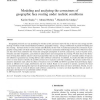Free Online Productivity Tools
i2Speak
i2Symbol
i2OCR
iTex2Img
iWeb2Print
iWeb2Shot
i2Type
iPdf2Split
iPdf2Merge
i2Bopomofo
i2Arabic
i2Style
i2Image
i2PDF
iLatex2Rtf
Sci2ools
ADHOC
2007
2007
Modeling and analyzing the correctness of geographic face routing under realistic conditions
Geographic protocols are very promising for wireless ad hoc and sensor networks due to the low state storage and low message overhead. Under certain idealized conditions, geographic routing – using a combination of greedy forwarding and face routing – has been shown to work correctly and efficiently. In this work we model and analyze the correctness of geographic routing under non-ideal realistic conditions. We present a systematic methodology for micro-level behavioral analysis that shows that conditions that violate the unit-graph assumption of network connectivity, such as location errors, obstacles and radio irregularity, cause failure in planarization and consequently face routing. We then discuss the limitations of fixing these failures and prove that local algorithms that use only information up to a limited number of hops are not sufficient to guarantee face routing delivery under arbitrary connectivity. In addition, we analyze the effect of location errors in more detai...
| Added | 08 Dec 2010 |
| Updated | 08 Dec 2010 |
| Type | Journal |
| Year | 2007 |
| Where | ADHOC |
| Authors | Karim Seada, Ahmed Helmy, Ramesh Govindan |
Comments (0)

